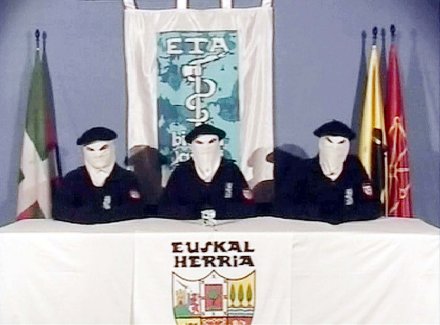A Spanish judge said Monday there was evidence of Venezuela "cooperating" with an alliance of the militant Basque separatist group ETA and the Revolutionary Armed Forces of Colombia (FARC), dpa reported.
Speaking in Hanover, Germany, Spanish Prime Minister Jose Luis Rodriguez Zapatero said Foreign Minister Miguel Angel Moratinos had requested an "explanation" from the Venezuelan government.
National Court judge Eloy Velasco charged seven suspected FARC members and six ETA suspects with planning to stage attacks against high-ranking Colombian politicians, including President Alvaro Uribe and his predecessor Andres Pastrana, while they were in Spain.
There was evidence of the Venezuelan "government's cooperation with the illegal collaboration" between ETA and FARC, the judge mentioned in his document, without linking Caracas directly with the plot to kill Uribe.
The ETA suspects charged by Velasco included Arturo Cubillas Fontan, who is married to a Venezuelan citizen and has held several government posts in the Latin American country since President Hugo Chavez took power in 1999.
The posts included that of the deputy director of an administrative office in the Agriculture Ministry, which Cubillas was given in 2005.
The document issued by Velasco also says ETA activists were accompanied by a man wearing a vest of the Venezuelan intelligence services and by Venezuelan soldiers on their way to a forest area where they gave an explosives-handling course to FARC members in 2007.
Cubillas oversaw ETA operations in the region starting in 1999, coordinating relations with FARC, Velasco said.
FARC asked ETA to locate Colombians who could be attacked while visiting or living in Spain, according to the judge.
In 2000, FARC member Victor Ramon Vargas came to Spain twice, allegedly to watch the Colombian embassy in Madrid and to check on the itineraries of then president Andres Pastrana during his visits to Spain.
Other potential targets included Colombian Vice-President Francisco Santos, then ambassador to Spain Noemi Sanin, other politicians and senior military officers, who would have been attacked in Spain or some other European Union country.
More recently, FARC also considered targeting President Alvaro Uribe, Velasco said.
The judge accused Cubillas, Vargas and another FARC suspect of conspiracy to carry out terrorist attacks.
The other accused face charges including illegal possession of explosives and collaborating with terrorists.
Media reports said Cubillas was in Venezuela and three others among the ETA suspects were in Cuba.
Velasco asked the Spanish government to seek Venezuelan and Cuban cooperation to obtain the extradition of suspects staying in those countries.
Velasco overtook an investigation launched earlier by prosecutors after Colombia said that FARC had sought contacts with ETA.
The information was based on emails found in the computer of Raul Reyes, the second-in-command of FARC, who was killed in an air raid by Colombian troops in 2008.
Velasco's document summarized evidence of the alleged links between FARC and ETA, which had previously been downplayed by the Spanish government.
The Basque separatists and the Colombian left-wing guerrillas have had contacts since the 1980s, exchanging information on weapons and guerrilla strategies and organizing military training in Colombian and Venezuelan camps, the judge said.
ETA has killed more than 800 people in its campaign for a sovereign Basque state since 1968. The much bigger FARC, which has thousands of soldiers, has fought the Colombian state in an armed conflict lasting more than 45 years.






